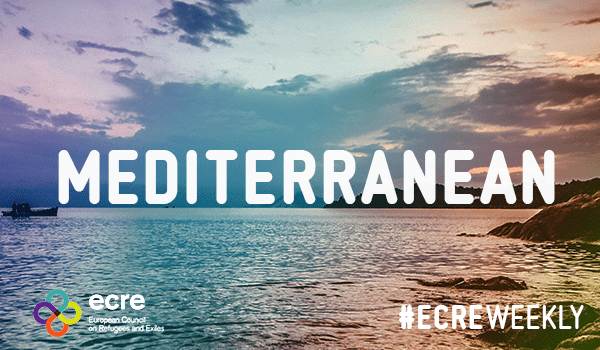A confidential EU report calls for the EU to continue training and equipping the so-called Libyan Coast Guard intercepting and returning people to widespread abuse. The UN Secretary-General warns of arbitrary detention, torture, and sexual violence in detention facilities run by Libyan authorities and other groups. On the Mediterranean, civilian search and rescue operators continue to save lives but the death count rises.
A report compiled by the head of Operation Irini (the EU mission charged with arms embargo surveillance), Italian Navy Rear Admiral Stefano Turchetto, has been obtained by the Associated Press. Reportedly, despite acknowledging that “the political stalemate” and internal division in Libya make it difficult to impose “proper behavioral standards … compliant with human rights, especially when dealing with irregular migrants” the report calls for a continuation of EU funding to and cooperation with the so-called Libyan Coast Guard. While the European Commission and EU’s External Action Service have declined to comment on the report, a spokesman confirmed the EU’s determination to increase Libyan capacity to manage search and rescues on the Mediterranean. On 19 January coast guard officials shot live rounds at least one person as he tried to swim to safety aboard the Banksy funded Louise Michel search and rescue vessel. A crew member of the NGO boat stated: “After they left, we returned to the position. We couldn’t find anyone in the water. But we did find an abandoned and deflated rubber boat”. According to the International Organization for Migration (IOM) the so-called Libyan Coast Guard intercepted and returned 604 people including 34 children between 16-22 January 2022, and a total of 32,425 people throughout 2021.
In a report on UN’s political mission in Libya (UNSMIL), SG Antonio Guterres reportedly warns of the missions continued documentation of cases of “arbitrary detention, torture, sexual violence and other violations of international law in facilities operated by the government and other groups”. According to the report, 12,000 people are currently detained in 27 official prisons and detention facilities across Libya with thousands more are detained illegally in “inhumane conditions in facilities controlled by armed groups or `secret’ facilities”. Recently, NGOs have submitted a case to the International Criminal Court alleging complicity by Malta and Italy in severe war crimes committed against migrants in Libya between 2017 and 2021. The violent crackdown on migrants and refugees by Libyan authorities continues as more than 600 people were attacked and detained after protesting for months for safe passage out of the country where they are under threat for their lives. NGOs, including Alarm Phone, Médecins Sans Frontières (MSF), and others are campaigning for the evacuation of refugees from Libya and changes to EU policy to end death at sea.
In December 2021 charges against Carola Rackete – the captain for the German civilian search and rescue organisation Sea Watch – were definitively dismissed. Rackete was arrested on orders from the Agrigento prosecutor’s office in June 2019 and charged with violating the ban on disembarking survivors rescued in the Strait of Sicily. The ban was imposed under the pretext of security decrees by the former interior minister Matteo Salvini. Salvini’s immunity as a government offical was removed by the senate in 2020, clearing the way for charges to be made against him for preventing the disembarkation of people saved at sea. The ruling upheld Rackete’s decision not to disembark in Libya – as the country not be considered safe – and criticized the ‘Salvini decrees’. Yet, government intimidation of and interference with civilian rescue missions by Italian and Maltese authorities continues. On 21 January the vessel Mare Jonio, operated Saving Humans Mediterranea was told assigned port in Sicily despite already having anchored in Lampedusa with several hundred rescued people onboard. The NGO warned that: “A 12-hour crossing in the Strait of Sicily in difficult weather and sea conditions, with more than 200 people crammed onto the main deck” was dangerous. 142 passengers were transferred the next day from Mario Jonio to a coastguard boat and taken to Lampedusa where the rest of the survivors could also finally disembark after days at heavy sea. On 25 January MSF reported that 439 people on board the Geo Barents rescue vessel were still awaiting safe port “while the Maltese authorities are just washing their hands and evading their responsibilities”, adding: “All our requests to Malta for a port to disembark in safety have been ignored or denied”. On 25 January Italian authorities reported the recovery of three dead bodies when a boat was intercepted off Lampedusa – another four people died before being port authorities had brought the boat to shore – 280 people survived.
According to the NGO Global Initiative departures from and through Tunisia are rising to levels not seen since 2011. Authorities in Tunisia reported on 21 January the deaths of four Tunisians, including a young girl, and seven others missing following a shipwreck off the country’s central city of Sfax. A spokesman from the National Guard told media: “According to witnesses, there were 32 migrants on board, all of them Tunisians,” adding: “We rescued 21 and quickly recovered a first body”. On 27 January, an estimated 36 people lost their lives when their boat sank off the coast of Tunisia, according to Tunisia’s Defense Ministry.
For further information:
- ECRE, Med: Rome Court Orders Humanitarian Visas for Two Afghans Within Ten Days, Ocean Viking Blocked in Italy, Case Submitted to ICC over Malta and Italy’s Complicity in Crimes in Libya, January 2022
- ECRE, Med: Tragedy Continues as Routes Change and Situation in Libya Deteriorates Even Further, January 2022
Photo: ECRE
This article appeared in the ECRE Weekly Bulletin. You can subscribe to the Weekly Bulletin here.

